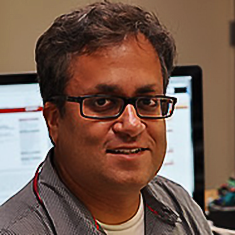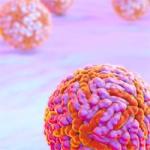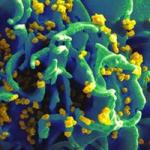
Research Topics
Examination of Virus-Host Interactions at Molecular, Cellular, and Animal Levels to Better Understand HIV Immunopathogenesis and the Development of Antiviral Resistance
The Model Development Section (MDS) seeks to further basic science understanding of HIV-1 replication, cell biology, and immunology as well as translate basic research findings to develop model systems that more faithfully mimic human immunodeficiency virus (HIV) infection in vivo. Current projects in the MDS include: (1) Understanding how HIV-1 exploits cell biological mechanisms to further virus replication. (2) Identification of innate intracellular mechanisms that counteract HIV-1 replication. (3) The development of improved nonhuman primate models to study HIV-1 pathogenesis and persistence.
Visiting scientists, graduate students, or postdoctoral candidates interested in the possibility of performing research studies in the MDS should contact Dr. Vineet KewalRamani (vineet@mail.nih.gov) for information about employment opportunities.
Biography
Dr. Vineet N. KewalRamani first developed an interest in retroviruses as an undergraduate in the University of Wisconsin at Madison. After choosing to pursue molecular biology as a career, he enrolled in the graduate program at the University of Washington in Seattle where he studied HIV molecular replication at the Fred Hutchinson Cancer Research Center. Upon completing his Ph.D. training in 1996, he received a fellowship from the Damon Runyon Cancer Research Foundation and a postdoctoral position from New York University where he examined HIV infection within an immunological context. While working in NYU, he joined in an effort to develop a mouse model for HIV replication using transgenic technologies. These studies provided the foundation for his group's current work at the National Cancer Institute. Today, his team investigates the role of host factors in HIV infection and the biology of HIV in animal models. HIV and other retroviruses hack the host organism's genetic program to propagate their code. They also rapidly evolve in the face of selective pressure. By illuminating how retroviruses co-opt host functions while evading antiviral drugs or immune responses, his lab seeks to develop new strategies to impede the dynamic viral program. Dr. KewalRamani was the 2011 and 2012 chair of the National Institutes of Health (NIH) Earl Stadtman Virology Search Committee and a co-organizer of the Cold Spring Harbor Laboratory 37th annual meeting on Retroviruses held in May of 2012. He is a past chair of the NIH Norman Salzman Virology Scientific Committee. He has served on the editorial boards of Journal of Virology, PLoS ONE, Retrovirology, and Virology. He was tenured by the NIH in 2010.
Selected Publications
- Hatziioannou T, Del Prete GQ, Keele BF, Estes JD, McNatt MW, Bitzegeio J, Raymond A, Rodriguez A, Schmidt F, Mac Trubey C, Smedley J, Piatak M Jr, KewalRamani VN, Lifson JD, Bieniasz PD. HIV-1-induced AIDS in monkeys. Science. 2014;344(6190):1401-5.
- Price AJ, Fletcher AJ, Schaller T, Elliott T, Lee K, KewalRamani VN, Chin JW, Towers GJ, James LC. CPSF6 defines a conserved capsid interface that modulates HIV-1 replication. PLoS Pathog. 2012;8(8):e1002896.
- Ambrose Z, Lee K, Ndjomou J, Xu H, Oztop I, Matous J, Takemura T, Unutmaz D, Engelman A, Hughes SH, KewalRamani VN. Human immunodeficiency virus type 1 capsid mutation N74D alters cyclophilin A dependence and impairs macrophage infection. J Virol. 2012;86(8):4708-14.
- Lee K, Mulky A, Yuen W, Martin TD, Meyerson NR, Choi L, Yu H, Sawyer SL, Kewalramani VN. HIV-1 capsid-targeting domain of cleavage and polyadenylation specificity factor 6. J Virol. 2012;86(7):3851-60.
- Lee K, Ambrose Z, Martin TD, Oztop I, Mulky A, Julias JG, Vandegraaff N, Baumann JG, Wang R, Yuen W, Takemura T, Shelton K, Taniuchi I, Li Y, Sodroski J, Littman DR, Coffin JM, Hughes SH, Unutmaz D, Engelman A, KewalRamani VN. Flexible use of nuclear import pathways by HIV-1. Cell Host Microbe. 2010;7(3):221-33.
Related Scientific Focus Areas



Microbiology and Infectious Diseases
View additional Principal Investigators in Microbiology and Infectious Diseases


This page was last updated on Friday, July 28, 2023